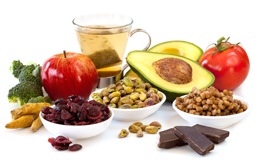
Inflammation is your body’s natural response to an injury, infection or disease. But it can also occur after a hard workout that leaves your body exhausted.
Though the process is meant to help your body heal; however, when inflammation becomes chronic, it can create a health risk. (Arthritis and Asthma are both thought to be inflammatory conditions.)
The right nutrients can keep your body in check since certain foods contain anti-inflammatory compounds that help reduce pain and swelling. By adding them to your regular diet, you can cut down on the inflammation, whether it’s from a hard workout or otherwise. Keep the following foods in your regular rotation.
Tart Cherry Juice
According to 2010 research from Oregon Health & Science University, published in the Journal of the International Society of Sports Nutrition, tart cherries can be a powerful anti-inflammatory.
For the study, researchers followed a group of 54 runners (36 males, 18 females, average age, 36) training for Oregon’s Hood to Coast race, a 197-mile relay race. Twenty-eight runners drank 335 ml of tart cherry juice for seven days before the race and 26 consumed a placebo beverage.
After the race, both groups reported pain, but the cherry juice drinkers rated their pain an average of 12, whereas the placebo drinkers rated their pain at an average of 37. (on a scale of 1 to 100)
Fatty Fish
Here’s another reason to order sushi. The fish could help fight inflammation in your body, according to a 2011 study out of Ohio State University, published in the journal Brain, Behavior and Immunity.
Researchers followed 68 medical students who were under high stress. Half of the students received omega-3 supplements and the other half received placebo pills.
The results? The students taking the omega-3 supplement notched a 20-percent reduction in anxiety compared to their placebo-taking peers, and their blood samples showed a significant reduction in cytokines, which foster inflammation.
Extra-Virgin Olive Oil
Olive oil can and should be a part of your daily rotation, if for nothing else than its inflammation-fighting properties, which were discovered almost by accident.
“I had considerable experience swallowing and being stung in the throat by ibuprofen from previous studies on its sensory properties,” says Monell Chemical Center biologist Gary Beauchamp, Ph.D, in this 2005 release. “So when I tasted newly-pressed olive oil while attending a meeting on molecular gastronomy in Sicily, I was startled to notice that the throat sensations were virtually identical.”
Beauchamp and a team of scientists then evaluated the properties of an unnamed compound in olive oil and realized that the intensity of the throat sting was related to the concentration of the compound oleocanthal.
The teams then researched whether ibuprofen and oleocanathal provide the same health benefits—and they did. Both ibuprofen and oleocanathal inhibit certain enzymes that cause inflammation, so, logically, the scientists concluded that olive oil is an anti-inflammatory.
Top your salad with it or use it instead of vegetable oil when cooking!
Tomatoes and Tomato Juice
If you’re not juicing yet, here’s a reason to try it—tomato juice can fight inflammation. In a 2013 study, researchers gathered a group of 106 overweight or obese females (obesity is considered a chronic inflammatory condition) from Tehran University of Medical Sciences, and assigned them to one of two groups. One group consumed 330 milliliters of tomato juice daily for 20 days, and one group drank water for 20 days. At the end of the 20 days, the group that drank the tomato juice showed a decrease in serum IL-6, which is a pro-inflammatory cytokine.
Tree Nuts
Almonds, hazelnuts, pine nuts, walnuts, pistachios—the list goes on—just about any kind will do. A 2012 study published in the Journal of the American College of Nutrition found that men and women who ate more than a one fourth of an ounce of tree nuts per day displayed lower levels of C-reactive protein, which is a marker for inflammation.
People who consumed tree nuts also have been proven to have lower body weight and a lower body mass index than their non-nut-crunching counterparts.
Tumeric
At the University of Arizona, researchers injected rats with a bacterial substance known to cause arthritis. The researchers noticed if they gave the rats turmeric first (also by injection), the rats suffered far less swelling. It’s suspected that its anti-inflammatory properties may make turmeric a therapeutic agent for inflammatory diseases like pancreatitis, arthritis, chronic anterior uveitus and inflammatory bowel disease.

